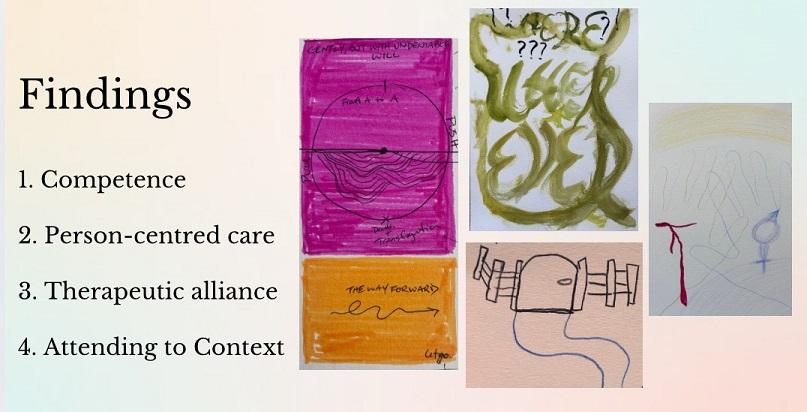Student Research Feature: Nikita Paddock - Amplifying Participants’ Perspectives of Beneficial Psychedelic Facilitation to Shape Future Practice

The School of Leadership Studies would like to extend our heartfelt congratulations to Nikita Paddock on the completion of a Master’s Thesis titled, Amplifying Participants’ Perspectives of Beneficial Psychedelic Facilitation to Shape Future Practice.
This thesis is available through RRU’s library here https://www.viurrspace.ca/items/e937ae20-a891-48ff-9aa9-b236fa9cf85f
We asked Nikita a few questions about this research and this is what they said:
What are some key takeaways from your thesis that would be helpful for other leaders?
The key takeaways from my research centred around understanding the benefits of using decolonizing methodologies to support evidence-based practice change. The methodologies I chose while exploring my research question "How might Ambio's psychedelic care practices be enhanced by understanding participants' perspectives of beneficial psychedelic facilitation?" were decolonizing methodologies, action-oriented methodologies, appreciative methodologies, and social constructivism methodologies. The collaborative nature of this research revealed rich and contextual data from participants' voices that enabled valuable learning in preparation for organizational change. The research demonstrated a novel approach to support evidence-based practice while remaining person-centred. Using decolonizing practices to support research in emergent areas of health care such as psychedelic care may support decolonizing healthcare practices and support organizational change that may maximize benefits and minimize risks. In addition, the contextual nature of the research affirmed the value of listening to participants, which rippled through the organization in dialogue centering participants as a priority during continuous growth and expansion. I think that using decolonizing methodologies supports organizational change greater than expected due to the complex and adaptive nature of individuals and many organizations.
How is the organization moving change forward based on your work?
The partnering organization has made collaborative effort to center participants and contextual data. An example includes the staff meetings, which include incorporating contextual data and stories to inform future practice. Within the ibogaine-based treatment protocols at Ambio Life Sciences, the clients and their subjective experiences are valued and continue to support ongoing change within the organization as it grows as a center for co-learning and excellence in ibogaine-related care.
What surprised you about your experience of the thesis process?
I was surprised by the way the thesis process influenced change with every interaction. Whether it was dialogue invoking new and unexpected insights, or the way research served as an opportunity to draw inspired individuals together with the aim of continuously improving practice, it was clear that each step of the process was important. Action-oriented research, being an iterative form of research that continues beyond completion of the thesis, catalyzes significant change that reached beyond my expectations. It is clear that engagement in the thesis process was a valuable opportunity for me to learn about engaging others in complex and adaptive systems change. In addition, being part of an emerging field while partnering with an in-demand organization and being supported by competent and skilled supervisors fostered an environment for me to contribute in an impactful way.
How are you applying lessons learned from your whole MA-Leadership journey?
During the MA- Leadership journey, I learned many lessons. The lessons served as a process toward embodying self-mastery and confidence. The opportunity to learn in the safe and supported process of completing a thesis helped me to grow. I think that the privilege of a master’s level education comes with social responsibility as well as the courage to be confident as a leader while taking a collaborative approach to impact systems changes. I learned about myself including my strengths and weaknesses, which supports the ongoing evolution of my own leadership journey.